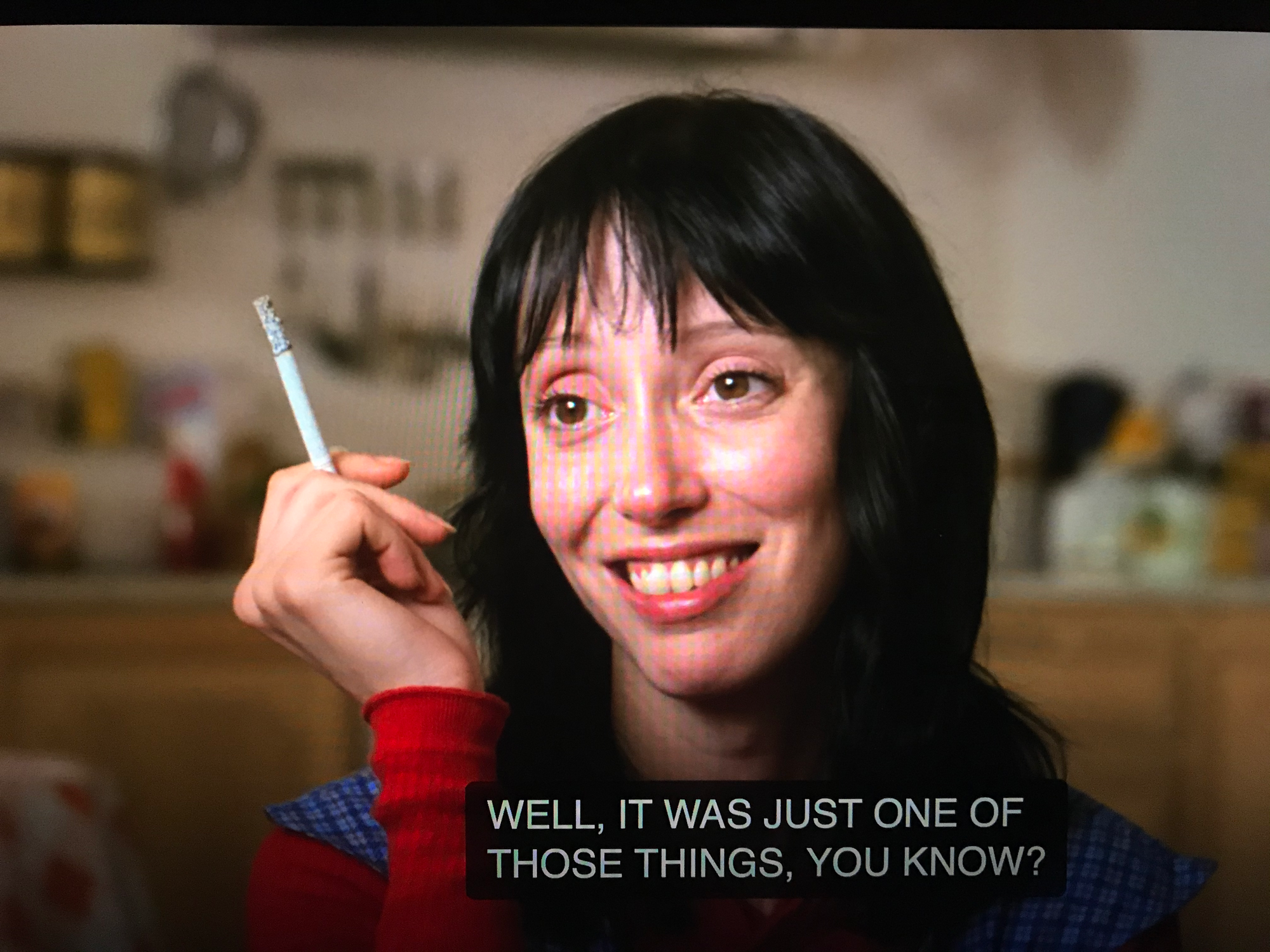Dressing Up in The Shining

I have a bad habit of reading TVTropes, the fan wiki which seeks to name and describe all known literary devices (the name is a misnomer, in the sense that they cover all media, but also not, in the sense that the books are mostly tie-ins and things they teach in school). TVTropes is a masterpiece in some ways – its fond, friendly, consistent voice; its balance of MST3K banter and real critical work – and some tropes have made their way into my permanent vocabulary. An "expy," for example, is a close copy of another writer's character who is just distinct enough to avoid a lawsuit. A "lampshade" is an onscreen acknowledgement that a writer is employing a cliché, usually one that's not doing the work the writer thinks it is.
TVTropes also has a couple of serious flaws. One is a tendency to read media shallowly and at face value, especially when it will allow the contributor to tick off a trope on their clipboard. The site's unwritten policy is to believe characters when they speak, no matter how self-pitying, unreliable, or incoherent they are, and it means the wiki is harder to enjoy when the story it describes is complex. Its other major flaw is that, frankly, it's a disaster at describing women. This is especially true of women with mental illness, or even merely eccentric ones. I went through a period of looking up every female musician with memorable fashion sense that I could think of on TVTropes, just to see if they were described as "cloudcuckoolanders." All of them were.
These two flaws work together in harmony on TVTropes' pages for The Shining, which I watched for the first time the other night. The thing about The Shining is that Jack Nicholson is fine in it. He's excellent at being a gaslighting piece-of-shit husband clenching and grinning his way through a job interview, not even bothering with superficial charm – just giving them muscle and ham until the job opens up. He's good as an axe murderer, too.
But the real miracle of The Shining is Shelley Duvall as Jack's wife, Wendy. From the moment she shuffles onscreen in her blue jumper and red tights, hair gone soft and limp with repeated redyings in comic-strip black, El Greco eyes unable to close to the horrors of the world, Duvall is magnetic. Her Wendy is broken by her disastrous marriage, but she's also an optimist, and it's terrible to see. She's always trying to impress, defend, and prop up Jack, who relies on her for his continuing presence in society while acting like she's ruined his life. She's also still a fan, drawing on her passion for horror movies to help her survive this one. We get the sense that Wendy's fandom also sustains her privately, gives her a world to which to retreat. When Jack finally tries to kill her, she doesn't so much escape him because she knows how horror works. She escapes him because he's chased her all the way to her position of greatest strength. At the beginning of the film, Wendy is trapped in Jack's mind, but at the end, Jack is trapped in Wendy's. The fact that she's trapped there too, and always will be, doesn't make her escape from him any less triumphant.
This brings me back to TVTropes. Apparently, Duvall's acting wasn't much appreciated when the film came out; she was nominated for the very first Razzie, in fact, which is a travesty. I can't tell you how bad a reader you have to be to think that Wendy's quirks – her sideways, tiptoeing way of moving; her air of shimmering psychic damage – are flaws rather than strengths of the performance. TVTropes notices this, and defends her, but its defense takes the form of an insanity plea:

Let's go over the terrible assumptions here:
- Duvall's performance was clearly the result of mental illness.
- People with mental illnesses can't be artists or make creative decisions, although they can be tormented into a sort of simulacrum of art.
- If a critic doesn't like a mentally ill person's art, they're crueler than other critics, because they're not critiquing art – they're critiquing raw emotion extruded into an artlike shape.
- A mentally ill person's account of their lived experience can be discounted in favor of a third-party pop-psychology observation by a stranger.
This is awful! It's also bleakly funny, because Duvall's performance in The Shining, like Marisa Berenson's in Barry Lyndon, is an eloquent portrayal of a victim of gaslighting. To see an actor gaslit about her professional work as a person who's being gaslit is amazing, and of course it's much worse in the context of the larger critical story about Duvall.
The Shining is about people with style being menaced by a person without a scrap of it. Wendy, her son Danny, and friendly psychic Dick Hallorann are all incredibly stylish people, in a way that speaks of work – Wendy obviously goes out of her way to keep Danny in charming novelty sweaters, and herself in cute jumpers and '70s-cool blouses, while Hallorann is iconic in his natty suits and bold resortwear. All three of them are also, conspicuously, not adult white men. Jack, who is, doesn't have style. He wears bland jeans, flannels, at one point a burgundy jacket which we only notice because it gets Advocaat spilled on it. The fact that the three of them are working throughout the film, working to keep up appearances, while Jack does no work at all and still holds all the power, is a pretty transparent subtext. You'd think everyone would watch the film and come away with some thoughts about gender, race, and mental illness which would throw the brilliance of Duvall's work into relief, but apparently not.